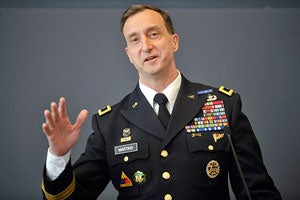On April 3, Brigadier General Mark Martins ’90, chief prosecutor at the Office of U.S. Military Commissions in the Department of Defense, delivered a major address at Harvard Law School on Legitimacy and the Limits of Command in Reformed Military Commissions. The lecture was sponsored by the National Security Journal and the National Security & Law Association.
Military commissions are military courts of law used to try offenses under the laws of war and other legal rules. As the chief prosecutor, Martins oversees the prosecution of the detainees in Guantanamo. Under a set of 2009 reforms, suspected terrorists must be tried by military commissions. Martins elaborated upon significant reforms that he has suggested should be made to the military commission system beyond those undertaken in the Military Commissions Act of 2009. He acknowledged that military commissions are controversial and that reforming the system is difficult, because reforms must consider public opinion while nonetheless addressing the asymmetric threat that terrorism presents.
“Terrorists are irregular, shifting, non-state actors who purposefully attack civilian populations, cleverly employ widespread new technologies, and patiently plot in the shadows of international boundaries and ungoverned terrain. By both scorning and cynically invoking the law for refuge, they tempt even peaceful peoples to respond outside the law. But such responses are a serious mistake,” he said. “Despite our enemy’s tactics, we must always operate in the space defined by the law and by our values. If we treat the law as a luxury, we undermine our legitimacy.”
Martins devoted a significant portion of his lecture to discussing the importance of the jury of officers, which he called the “heart of the military justice system,” in order to demystify it and explain the jury’s importance to the legitimacy of military commissions. He traced the history of military juries and the parallel development of the modern civilian jury. A key point of difference from civilian juries, he said, is that military jurors are not drawn randomly from the population, but rather are selected based on their age, education, training, experience, length of service and judicial temperament. He also discussed the fundamental role that diversity plays in the legitimacy of both civilian and military juries.
“Having served on a court-martial as a young infantry lieutenant, spent many years as a trial counsel and staff judge advocate, and had convening authority myself as a general officer in field command, I know how mindful selection officials are that diversity and representativeness on the military panels serve the interests of justice,” Martins said.
The military jury system is key to the legitimacy of military commissions because the jury members provide accountability over those who wage war while constraining the arbitrary use of power. Martins said that reforms to increase the legitimacy of the system have produced structural arrangements, rules, judicial decisions and transparency mechanisms designed to protect the officers deliberating an accused person’s fate from being influenced by anything other than their duty to do justice.
“Juries are one of the most important bulwarks against the despotic and arbitrary use of authority ever devised, and they are part of the genius of American legal institutions – civilian and military,” he said.
Martins recently announced that this will be his last assignment in the military and he will not seek promotion or reassignment, in order to place himself beyond any suspicion of self-advancing motives. The decision, he said, stems from a desire to strengthen the legitimacy of the system and demonstrate that there will be no improper influences on his decisions and actions. He encouraged students in the audience to read a trial transcript or an appellate opinion associated with the trial proceedings, so that those trained in the civilian legal system can see for themselves that the military commission system is equally committed to legitimacy and fairness.
“If students and other observers withhold their judgment of the reformed military commissions until they observe a trial firsthand or read these materials, I believe that they will see a system that is fair and legitimate, and deserving of their confidence.”
Listen to interview with Martins on WBUR’s Morning Edition on April 4, 2012: A Prosecutor Makes The Case For Military Trials
